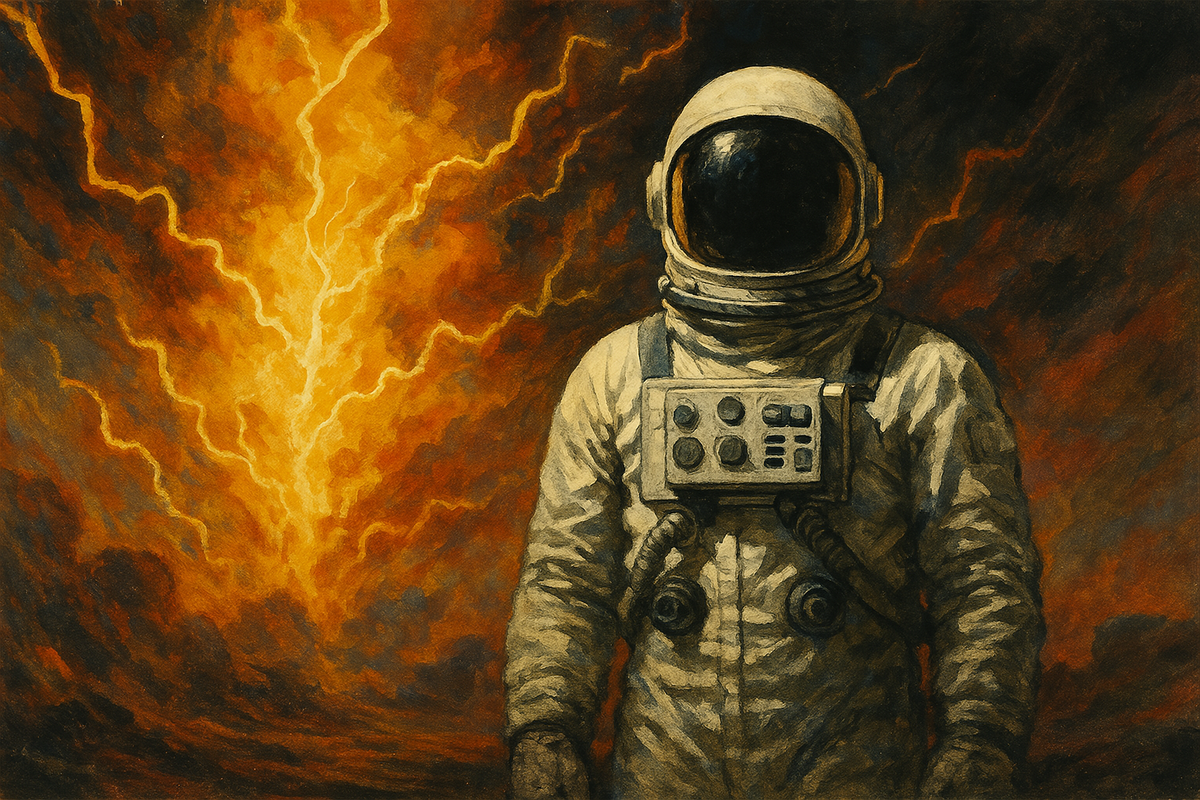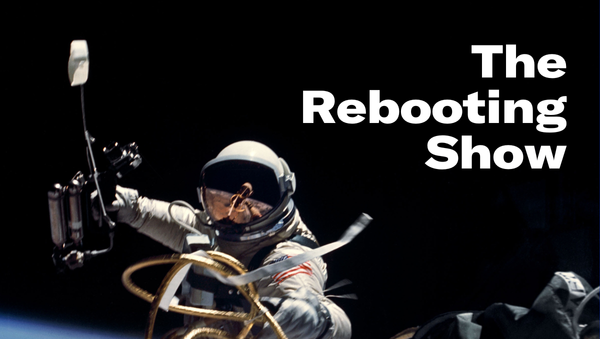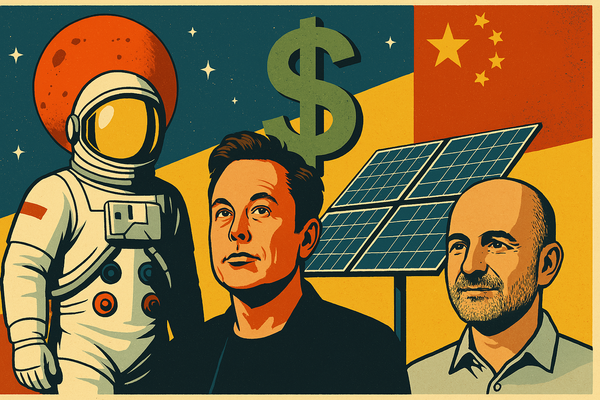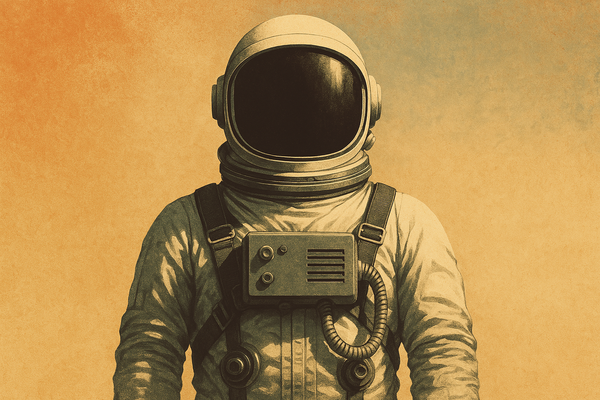Volatility
Wild swings are now the norm

Some things to know about:
- The Rebooting is partnering with Marketecture Media for the New Growth Agenda salon at Cannes on June 17. We will both be holding small-group discussions at our space just off the Croisette. We’re also having a cocktail. Looking forward to collaborating on this with Ari, Jermey and ATG. See more information here and get in touch for partnership opportunities.
- At The Rebooting’s next Online Forum on April 23 at 1pmET, I’ll speak with Metro UK and Marigold about how Metro is using personalization to increase conversion and engagement with newsletters. Join us.
- We are collaborating on a dinner for marketers and agencies at Possible later this month in Miami. Put your information here if you’re a marketer or agency executive interested in attending.
- Interesting job: Indiana University is hiring an assistant dean of external partnerships to build ties between its media school and the media industry. The job listing is here. Get in touch if you want to be connected to Paul Wright to learn more.
Volatility as baseline expectation
The stock market rollercoaster since “Liberation Day” was the most volatile since 1978, but it had a familiar feel to it. The girding for recession is habit now, even if economists and the All-In podcast guys continue their track record of predicting five of the last three downturns. The meek messaging from corporate titans is familiar: They want certainty and stability. Good luck with that.
I remember after the dot-com collapse listening to earnings calls with frazzled CEOs, many of whom were in over their heads, note a “lack of visibility.” (In one legendary call, the Agency.com CEO got into a shouting match with an analyst. This was a time when companies making websites and banner ads were publicly traded.) Predictability is the watchword of corporations. Predictable environments allow them to spend more freely, take more risks and have more confidence. Never forget that psychology drives markets.
It’s not all that different for anyone in an economy. Most people do not like volatility and uncertainty. It’s uncomfortable. Since Covid, we have increased our tolerance for volatility and uncertainty. It’s become the norm. Volatility is not chaos, which is when there is a complete breakdown of systems, although the line is getting fuzzier.
Think of how little stability there is in most careers now. In fact, the entire notion of a “career path” is woefully outdated. A surge in law school applications is an indicator of a recession. That isn’t much of a safe haven anymore. It would make more sense for LLC registrations to go up. Rather than seek certainty, it’s best to embrace uncertainty.
It would only stand to reason that this kind of precariousness would become a feature of the overall economy. If the market is permanently volatile, businesses will need to adapt, just the same way the Boss Class likes to lecture workers to embrace change.
The media industry is inured to this by now. There’s little stability and certainty on offer. Formerly stable distribution like search is extremely volatile. The quest for “controllable” audiences through direct connections is smart, only it provides just a measure of stability. Advertising has always been volatile. The fortunate publishers have diversified enough into subscriptions. Ads always get cut, no matter how persuasive the Ad Age column warning against it.
The brief respite to the global tariff war is not the end, the beginning of the end or even the end of the beginning. Volatility and uncertainty is here to stay. Even volatility gauges are growing too volatile. The impulse is to treat this as yet another passing storm. It's just as likely this is part of what Nick Denton said was the story of our times as Trump seeks to refashion a new global order to replace neo-liberalism/globalization. The downstream impacts of even attempting that will be felt far and wide, not to mention as AI infiltrates all aspects of the economy and society. The only constant seems to be that the bond markets are in charge.
The immediate near-term impacts are well known and from a playbook written when stability was more or less the norm. Companies will delay decisions on hiring and expansion in the fruitless quest to get more visibility, cut back on discretionary spending in areas like advertising, and overall shift to risk-off mode.
These temporary measures are likely not enough. They are rested on a false assumption that stability is the baseline. But it’s clear that for now, volatility is the baseline. That means moving from playing a wait-and-see game to building resilient systems for an unpredictable environment that rewards optionality and adaptability.
The instinct is to wait out turbulence as a phase to manage rather than a permanent condition. But if you're building in media right now, you don't have that luxury. You have to keep operating, even if the ground won't stop moving.
Forecasting is mostly theater. The savvier operators know that most planning decks are narratives meant to project control, not roadmaps to reality. Scenario planning and modularity matter more in an unpredictable environment with ambiguous market signals.
Operator energy beats coordinator energy. The peak of the ZIRP era was likely the poolside day-in-the-life product manager video from 2022. Volatility will drive further what-did-you-get-done-this-week approaches. The Silicon Valley vogue for "high-agency" people will spread.
Sentiment is the new reality. The stock market's $2 trillion swing from a mistaken report by a pseudonymous X account should put to rest any notion that markets are about fundamentals. They're about vibes.
AI is a new variable, not a stabilizer. Shopify CEO Tobi Lütke had a semi-viral memo that set “reflexive AI use” as a baseline expectation for all jobs. The more-with-less shift is permanent. And it will only accelerate as “superhuman AI” comes online and disrupts more than just the market for coders.
Margins matter. High-growth models worked when capital was cheap and steady. That's not the case anymore. The reward now is in constraint: in keeping headcount in check, stacking variable costs over fixed, and knowing exactly what you're spending and why.
The craving for stability will continue. I believe it's fruitless. Better to adapt to a new environment than pine for the return of the familiar and comfortable.
Thanks for reading. Send me a note with feedback by hitting reply.




